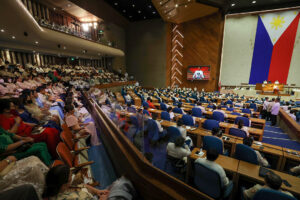
House committee approves RBH on charter economic amendments
THE HOUSE Committee of the Whole approved on Wednesday Resolution of Both Houses (RBH) No. 7 via voice vote, paving the way for amendments to the Constitution’s economic provisions to move forward.
House Deputy Majority Leader Neptali M. Gonzales II said that the House deliberations on liberalizing economic provisions of the Constitution are on track.
The House seeks to approve the proposed constitutional amendments before the Easter break on March 23.
On the last day of RBH deliberations, legislators heard arguments from the Department of Foreign Affairs, a representative of which testified that foreign ownership limits in the Constitution violate World Trade Organization (WTO) rules on equal treatment and restrict government participation in free trade deals.
Undersecretary Jesus Gary S. Domingo told the panel reviewing RBH 7 that the foreign-ownership restrictions in the charter run counter to the national treatment exception rules of the WTO.
Under WTO rules, economies are allowed to make exceptions regarding foreign entry for industries like media and aviation. Mr. Domingo said, “But not economy-wide restrictions.”
“The WTO principles recognize the right of members to regulate foreign investments for prudential reasons, but no blanket restriction bans,” he said in his statement to the committee.
Mr. Domingo said the principles of non-discrimination promoted by the United Nations (UN) are also meant to protect foreign companies and investors.
“Non-discrimination, a core UN principle outlined in agreements and charters such as the Universal Declaration of Human Rights, applies to discrimination against foreign companies and investors,” he told the panel.
The WTO also promotes the principle of progressive liberalization of markets to allow the entry of foreign entities and investors, increasing their market participation over time, he added.
Mr. Domingo also said economic integration in Southeast Asia has been hindered by the Constitutional limits on foreign participation.
“The trend in ASEAN (Association of Southeast Asian Nations) is towards regional economic integration,” he said. “It is very difficult to harmonize our policies and activities given that our neighbors have liberal investment regimes,” Mr. Domingo said.
“If the phrase ‘unless otherwise provided by law’ is added… Congress would have control over lifting restrictions (via) regular legislation,” he added. “The addition of the suggested phrase provides flexibility.”
Former Finance Secretary Margarito B. Teves said that “removing these restrictive provisions in our Constitution would send a clear and compelling message to foreign investors” that their investments are welcome in the Philippines.
“Our investment environment should be at par with our ASEAN counterparts to be more competitive in attracting foreign direct investment,” he said. “Removing the restrictive provisions in the Constitution will enable the Philippines to have the flexibility to adjust quickly to changing international and domestic economic conditions,” he added.
Emmanuel Santos, an economist for the South Australia state government, noted that Vietnam has recently overtaken the Philippines in per capita gross domestic product (GDP) due to its economic liberalization in 1986.
“In 1985, the Philippine per capita GDP was three times that of Vietnam,” he said. “But due to their opening up through the Doi Moi economic reforms of ‘86, they have finally overtaken us 35 years later.”
Mr. Santos also included in his discussion the need for an affordable and reliable domestic power distribution system to allow industries uninterrupted operations that could spur economic growth.
“Our energy-intensive industries are not able to thrive as a result of high energy costs,” he said. “Highest (electricity costs for consumers) in the region, double that of Vietnam.”
Electrical distribution expenses in the Philippines account for 30% of the charge paid by consumers. — Kenneth Christiane L. Basilio



